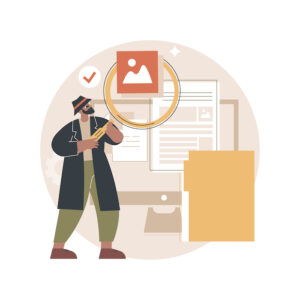Stay Ahead of Critical Contract Dates: The Power of Contract Lifecycle Management
- Posted on

As a business owner or manager, you know that contracts are crucial to your daily operations. Whether you’re negotiating with vendors, managing employee agreements, or working with clients, contracts help ensure that everyone is on the same page and that your business is protected. However, managing contracts can be time-consuming and complicated, so effective contract lifecycle management is so important. In this article, we’ll explore the key benefits of effective contract lifecycle management and provide tips for how you can improve your contract management processes for greater success.
Contract Lifecycle Management Goals
Now that we’ve established the importance of effective contract lifecycle management let’s take a closer look at some specific goals that businesses might have in this area. By understanding these goals, you can better tailor your contract management processes to meet your organization’s unique needs and achieve greater success. In the following sections, we’ll explore some common contract lifecycle management goals and provide tips for how you can reach them. Whether you’re looking to reduce costs, streamline workflows, or improve collaboration, a contract management solution can help you get there. So, let’s dive in and explore these goals in more detail!
Improved organization and efficiency
By clearly understanding your contract management processes, you can ensure that everything is running smoothly and that nothing is falling through the cracks. This might involve streamlining your workflows, automating certain tasks, or implementing a contract management software solution to help you stay on top of everything. With improved organization and efficiency, you can save time, reduce errors, and ultimately achieve greater success in your contract management efforts.
Reduced risk and increased compliance
There are significant legal and financial risks associated with non-compliance or other issues. Effective contract lifecycle management can minimize these risks by ensuring all contracts are properly reviewed, approved, and monitored throughout their lifecycles. This might involve implementing standardized processes for contract creation and approval, ensuring compliance with relevant laws and regulations. Alternatively, you can use contract management software to track contract performance and identify potential issues.
Enhanced communication and collaboration
By providing a centralized platform for all contract-related information, stakeholders across departments can access the information they need in real-time. This means that everyone is on the same page regarding contract terms, renewals, and obligations, which minimizes misunderstandings and reduces the likelihood of disputes. Additionally, contract management software often includes features such as task assignments and notifications, which can streamline the contract process and keep everyone accountable for their responsibilities. This enhanced communication and collaboration ultimately leads to greater efficiency and effectiveness in managing contracts.
Cost savings
By streamlining the contract process, businesses can reduce the time and resources spent on manual tasks, such as data entry and contract review. This, in turn, can increase productivity and efficiency, allowing businesses to allocate their resources to other areas of the organization. Additionally, improved compliance and reduced risk can result in cost savings by mitigating potential legal issues and penalties.
Improved customer and vendor relationships
By ensuring that all parties understand and comply with the terms of their contracts, businesses can avoid misunderstandings and disputes that can strain relationships. Additionally, effective contract management can help companies to identify opportunities to improve their relationships by highlighting areas where both parties can benefit from adjustments to the contract terms. Finally, through improved communication and collaboration, businesses can build a foundation of trust and respect with their customers and vendors, leading to more robust, more successful relationships in the long run.
Common challenges businesses face to achieve their contract management goals
Managing contracts can be a complex and time-consuming process for businesses. Despite the many benefits of contract lifecycle management, companies often need help in achieving their goals. This section will explore some of the most common challenges businesses encounter in their contract management journey and provide actionable solutions to overcome them.
Limited resources
With limited staff and budget, allocating the necessary time and resources to manage contracts throughout their lifecycle effectively can take time and effort. This can lead to missed deadlines, overlooked clauses, and other contract management issues, ultimately resulting in costly legal disputes.
Without sufficient resources, businesses may be unable to implement and maintain a robust contract management system, which can lead to missed opportunities for cost savings, increased risk, and poor vendor/customer relationships. For example, a company with limited resources lacks the personnel to review and negotiate contracts on time, leading to missed deadlines and lost revenue. Similarly, a company with outdated technology may struggle to keep track of contract data, resulting in missed renewal dates or a failure to identify potential risks. In short, limited resources can make it difficult for businesses to achieve their contract management goals. They must find ways to overcome these challenges to succeed in this critical area.
Siloed processes
When processes are not integrated, there is often duplication of effort, inefficiencies, and a lack of visibility and coordination. For example, sales and legal teams may not have access to the same contract data, leading to delays in contract execution or missed opportunities. Similarly, contract terms may not be communicated effectively to relevant departments, leading to misunderstandings and disputes. Businesses need to address these siloed processes to achieve better collaboration and ensure that all stakeholders are aligned in their approach to contract management.
Siloed processes can hinder effective contract management by causing inefficiencies and bottlenecks in the contract lifecycle. When different departments or stakeholders use their own separate systems and methods to handle contract-related tasks, it can create silos of information that are not easily accessible or shareable by others. This can lead to a lack of visibility and control over contract processes, resulting in delayed or missed deadlines, errors, and even legal disputes. Siloed processes can also make it challenging to track contract changes or ensure compliance with contract terms and regulations.
To overcome this challenge, businesses should adopt a centralized contract management system that enables collaboration and streamlines communication between different teams and departments. Using a single platform for all contract-related tasks allows stakeholders to access and share information more easily, ensuring everyone is on the same page and has access to the most up-to-date contract data.
Tips to overcome challenges
Effective contract management is crucial for any business to ensure compliance, minimize risks, and maximize profits. However, achieving the desired outcomes can be challenging due to limited resources, siloed processes, and other barriers. This section will provide practical tips to help businesses overcome these challenges and achieve their contract management goals. By focusing on key priorities, investing in technology, promoting collaboration, providing training and support, communicating the benefits, and starting small, businesses can streamline their contract management processes, save time and resources, and increase their overall efficiency and success.
Focus on key priorities: Identify the most critical aspects of your contract management process and focus on improving those first. This can help you make the most significant impact with limited resources.
Invest in technology: Utilize contract management software to streamline your process, improve collaboration, and reduce manual work. This investment can help you save time and money in the long run.
Promote collaboration: Encourage cross-functional teams to collaborate and share information to break down silos and improve communication. This can help you avoid redundant work and ensure everyone is on the same page.
Provide training and support: Ensure your team has the necessary skills and knowledge to manage contracts effectively. Training and support can help you avoid costly mistakes and improve efficiency.
Communicate the benefits: Help your team understand the benefits of effective contract management and how it can positively impact the organization. This can help build buy-in and support for the process.
Start small: Don’t try to tackle everything at once. Instead, start with a small pilot project and use it as a learning opportunity to refine your process before scaling up. This can help you avoid overwhelming your team and ensure you’re on the right track.
Benefits of effective contract lifecycle management
Effective contract lifecycle management can benefit businesses, making it a critical component of overall success. One of the benefits is cost savings, which can reduce the risk of non-compliance, penalties, and legal disputes, leading to costly fines and legal fees. In addition, effective contract management can help identify cost-saving opportunities, such as renegotiating contracts, optimizing payment terms, and eliminating expenses.
Improved efficiency is another key benefit of effective contract lifecycle management. Businesses can reduce manual tasks and increase productivity by automating and streamlining contract management processes. This can free up time and resources, allowing employees to focus on other important tasks and goals.
Enhanced collaboration is another benefit of effective contract management. By promoting collaboration and communication between different departments and stakeholders involved in the contract process, businesses can ensure that all parties are aligned and working towards the same goals. This can lead to better outcomes, faster decision-making, and more successful contracts.
Effective contract management can also lead to better risk management. By adequately assessing, identifying, and mitigating contract risks, businesses can reduce the likelihood of negative outcomes, such as legal disputes, financial losses, and reputational damage. This can help companies to protect their assets and maintain a strong reputation in the marketplace.
Finally, effective contract management can provide greater agility for businesses. By using data and insights from contract management processes, companies can quickly adapt to changing market conditions, customer demands, and regulatory requirements. This can allow businesses to respond to opportunities and challenges faster, making them more competitive and better positioned for success in the long term.
Conclusion
In conclusion, effective contract lifecycle management is crucial for businesses to streamline their processes, reduce costs, mitigate risks, and enhance collaboration. However, achieving effective contract management can be challenging, with limited resources, siloed processes, and complex regulations posing significant obstacles. By implementing the tips and strategies discussed in this guide, such as investing in technology, focusing on key priorities, providing training and support, and promoting collaboration, businesses can overcome these challenges and reap the benefits of successful contract management. The importance of contract management cannot be overstated. By taking action now, you can position your company for greater overall success.







